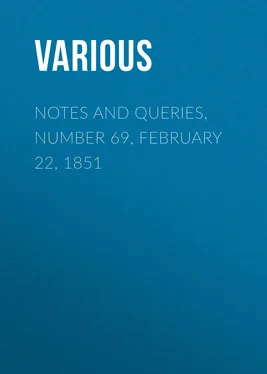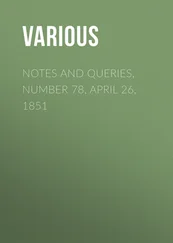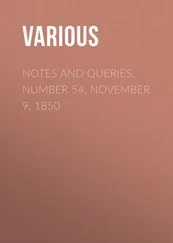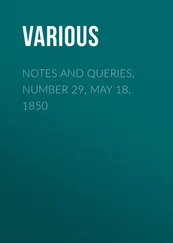Various - Notes and Queries, Number 69, February 22, 1851
Здесь есть возможность читать онлайн «Various - Notes and Queries, Number 69, February 22, 1851» — ознакомительный отрывок электронной книги совершенно бесплатно, а после прочтения отрывка купить полную версию. В некоторых случаях можно слушать аудио, скачать через торрент в формате fb2 и присутствует краткое содержание. Жанр: foreign_antique, periodic, foreign_edu, на английском языке. Описание произведения, (предисловие) а так же отзывы посетителей доступны на портале библиотеки ЛибКат.
- Название:Notes and Queries, Number 69, February 22, 1851
- Автор:
- Жанр:
- Год:неизвестен
- ISBN:нет данных
- Рейтинг книги:4 / 5. Голосов: 1
-
Избранное:Добавить в избранное
- Отзывы:
-
Ваша оценка:
- 80
- 1
- 2
- 3
- 4
- 5
Notes and Queries, Number 69, February 22, 1851: краткое содержание, описание и аннотация
Предлагаем к чтению аннотацию, описание, краткое содержание или предисловие (зависит от того, что написал сам автор книги «Notes and Queries, Number 69, February 22, 1851»). Если вы не нашли необходимую информацию о книге — напишите в комментариях, мы постараемся отыскать её.
Notes and Queries, Number 69, February 22, 1851 — читать онлайн ознакомительный отрывок
Ниже представлен текст книги, разбитый по страницам. Система сохранения места последней прочитанной страницы, позволяет с удобством читать онлайн бесплатно книгу «Notes and Queries, Number 69, February 22, 1851», без необходимости каждый раз заново искать на чём Вы остановились. Поставьте закладку, и сможете в любой момент перейти на страницу, на которой закончили чтение.
Интервал:
Закладка:
Vappa , nebulo , and similar terms, are freely applied to their characters; invidia , κακοήθεια, &c., to their motives. The following is a specimen of the way he handles them:—
"Dantes Poëta illustrissimum Christianissimorum Regum Franciæ genus à laniis Parisiensibus deducit, utique tam vere, quam ille tenebrio nostrum à scalarum fabro: quas mirum, ni auctor generis in suspendium eorum parabat , quos vaticinabatur illustri nobilitate suæ obtrectaturos."
Now the charge of a ladder upon their shield was certainly borne by the several branches of this family long before any of them became masters of Verona; and I should suggest that it originated in some brilliant escalade of one of the first members of it. Thus, of course, it would remind us all of perhaps the earliest thing of the kind—I mean the shield and bearings of Eteoclus before Thebes:
"Εσχημάτισται δ' ἀσπὶς οὐ σμικρὸν τρόπον·
Ἀνὴρ δ' ὁπλιτης κλίμακος προσαμβάσεις
Στείχει πρὸς ἐχθρῶν πύργον, ἐκπέρσαι θέλων."
H–n, Jan. 28. 1851.
INEDITED BALLAD ON TRUTH
I send you herewith a copy of an ancient ballad which I found this day while in search of other matters. I have endeavoured to explain away the strange orthography, and I have conjecturally supplied the last line. The ballad is unhappily imperfect. I trust that abler antiquaries than myself will give their attention to this fragmentary poem.
"What more poyson . than ys venome.
What more spytefull . than ys troozte. 1 1 Truth, I presume, is meant, though it does not seem to agree with the context, which is pure nonsense in its present condition.
Where shall hattred . sonere come.
Than oone anothyr . that troozte showthe.
Undoyng dysplesure . no love growthe.
And to grete 2 2 Great.
men . in especyall.
Troozte dare speke . lest 3 3 Least.
of all.
"And troozte . all we be bound to.
And troozte . most men now dothe fle. 4 4 Flee.
What be we then . that so do.
Be we untrewe . troozte saythe ee. 5 5 Yea.
But he y ttellethe troozte . what ys he.
A besy foole . hys name shalle ronge. 6 6 Ring, I fancy.
Or else he hathe an euyle tonge.
"May a tong . be trew and evyle.
Trootze ys good . and evyle ys navtze. 7 7 Naught.
God ys trootze . and navzt ys y edevyle.
Ego sum veritas . or 8 8 Our.
lord tavzt. 9 9 Taught.
At whyche word . my conceyt lavzt. 10 10 Laughed.
To se 11 11 See.
our Lorde . yff 12 12 If.
foly in hym be.
To use troozt . that few doth but he.
"To medyle w ttrouthe 13 13 Here the orthography changes.
. no small game.
For trouthe told . of tyms ys shent.
And trouthe known . many doth blame.
When trouthe ys tyrned . from trew intent.
Yet trouthe ys trouthe . trewly ment. 14 14 Meant.
But now what call they trouthe . trow ye.
Trowthe ys called colored honestè.
"Trouthe . ys honest without coloure.
Trouthe . shameth not in no condycyon.
Of hymself . without a trespasowre.
By myst and knowne . of evyle condycyon.
But of trouthe thys ys y econclusyon.
Surely good ordre there ys brokyne.
Where trouthe may not . nor dare be spokyne. 15 15 I think there must be some allusion here, which can only be arrived at by knowing the date of its composition.
"Trouthe many tyms ys cast.
Out of credence . by enformacyon.
Yet trouthe crepthe 16 16 An elision for creepeth; possibly an intermediate etymological state of creeps .
out at last.
And ovyr mastrythe cavylacyon. 17 17 From "to cavil."
That I besech Cryst . every nacyon.
May use trouthe . to God and man.
* * that he * not * syn * * ."
* * * * * *
I would fill up the lacuna—
"Now that he do not syn . we can."
Perhaps, I repeat, some more able antiquaries will give their attention to this, and satisfy me on the points of punctuation, date, &c.
Kenneth R. H. Mackenzie.Minor Notes
Ayot St. Lawrence Church (Vol. iii., pp. 39. 102.). Ayot St. Lawrence, Herts, is another deserted church, like that of Landwade,—in fact a ruin, with its monuments disgracefully exposed. I was so astonished at seeing it in 1850, that I would now ask the reason of its having been allowed to fall into such distress, and how any one could have had the power to build the present Greek one, instead of restoring its early Decorated neighbour. I did not observe the 2 ft. 3 in. effigy alluded to in Arch. Journ. iii. 239., but particularly noted the elegant sculpture on the chancel arch capital.
I would suggest to Mr. Kelke, that the incumbents of parishes should keep a separate register, recording all monuments, &c. as they are put up, as existing, or as found in MS. church notes, or published in county histories. In the majority of parishes the trouble of so doing would be trifling, and to many a pleasant occupation.
A. C.Johannes Secundus — Parnel — Dr. Johnson. —In Dr. Johnson's Life of Parnel we find the following passage:—
"I would add that the description of Barrenness , in his verses to Pope, was borrowed from Secundus; but lately searching for the passage which I had formerly read, I could not find it."
I will first extract Parnel's description, and then the passage of Secundus; to which, I suppose, Dr. Johnson referred.
"This to my friend—and when a friend inspires,
My silent harp its master's hand requires,
Shakes off the dust, and makes these rocks resound,
For fortune placed me in unfertile ground;
Far from the joys that with my soul agree,
From wit, from learning—far, oh far, from thee!
Here moss-grown trees expand the smallest leaf,
Here half an acre's corn is half a sheaf.
Here hills with naked heads the tempest meet,
Rocks at their side, and torrents at their feet;
Or lazy lakes, unconscious of a flood,
Whose dull brown Naiads ever sleep in mud."
Secundus in his first epistle of his first book (edit. Paris, p. 103.), thus writes:—
"Me retinet salsis infausta Valachria terris,
Oceanus tumidis quam vagus ambit aquis.
Nulla ubi vox avium, pelagi strepit undique murmur,
Cœlum etiam largâ desuper urget aquâ.
Flat Boreas, dubiusque Notus, flat frigidus Eurus,
Felices Zephyri nil ubi juris habent.
Proque tuis ubi carminibus, Philomena canora,
Turpis in obscœnâ rana coaxat aquâ."
The King's Messengers, by the Rev. W. Adams. —Ought it not to be remarked, in future editions of this charming and highly poetical book (which has lately been translated into Swedish), that it is grounded on one of the "examples" occurring in Barlaam and Josaphat ?"
In the third or fourth century, an Indian prince names Josaphat was converted to Christianity by a holy hermit called Barlaam. This subject was afterwards treated of by some Alexandrian priest, probably in the sixth century, in a beautiful tale, legend, or spiritual romance, in Greek, and in a style of great ease, beauty, warmth, and colouring. The work was afterwards attributed to Johannes Damascenus, who died in 760. In this half-Asiatic Christian prose epic, Barlaam employs a number of even then ancient folk-tales and fables, spiritually interpreted, in Josaphat's conversion. It is on the fifth of these "examples" that Mr. Adams has built his richly-glittering fairy palace.
Читать дальшеИнтервал:
Закладка:
Похожие книги на «Notes and Queries, Number 69, February 22, 1851»
Представляем Вашему вниманию похожие книги на «Notes and Queries, Number 69, February 22, 1851» списком для выбора. Мы отобрали схожую по названию и смыслу литературу в надежде предоставить читателям больше вариантов отыскать новые, интересные, ещё непрочитанные произведения.
Обсуждение, отзывы о книге «Notes and Queries, Number 69, February 22, 1851» и просто собственные мнения читателей. Оставьте ваши комментарии, напишите, что Вы думаете о произведении, его смысле или главных героях. Укажите что конкретно понравилось, а что нет, и почему Вы так считаете.












